Jul 01, 2025
Author:Sam Wonder
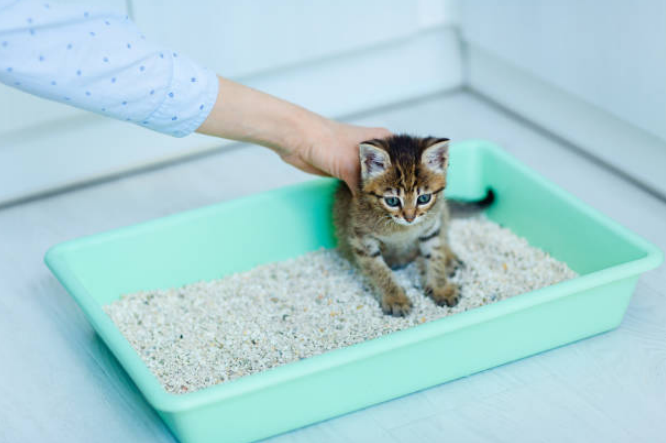
Owning a cat is a joy, but dealing with litter box odors? Not so much. Many pet parents turn to scented cat litter to mask those unpleasant smells. But is scented litter bad for cats? This is a common question that worries pet parents a lot. Scented litter may be the easy way out, yet it may influence the health and happiness of your cat. The nose of cats is sensitive, and scents can easily irritate them more than you imagine. Plus, some chemicals in scented litter raise safety concerns.
So what are the scented cat litter's pros & cons and how it affects the cat's health, behavior, and comfort. We will also tell you how to keep the litter box odor-free without using strong perfumes.
Let’s explore whether scented litter is a friend or foe to your furry companion.
While scented litter may seem like a pleasant choice for your home, it can pose hidden health risks for your cat, especially regarding breathing and skin sensitivity.
● Potential Respiratory Issues
When a cat uses scented litter, there is a risk of exposure to chemicals that may irritate the cat. When the fine dust of clay-based littering is combined with fragrances, it may lead to either coughing or sneezing. Unscented litter is less harmful to your cat because she has breathing problems.
● Skin and Paw Irritation
Scented litter may irritate the paws of your cat. Chemicals or essential oils may cause redness or discomfort. Because cats groom themselves, they may ingest these substances, which can lead to stomach upset.
Studies in 1991 revealed that perfumes may cause toxic and allergic skin reactions. Source
Beyond physical health, scented litter can also unexpectedly affect your cat’s behavior.
● Litter Box Avoidance
Cats prefer a clean and neutral-smelling litter box. If the scent is too strong, they may avoid using it altogether, leading to accidents outside the box. ISupposeyour cat is showing unusual litter box behavior, like urinating outside the box but still pooping inside,. In that case, you should check out this guide for possible reasons and solutions.
● Stress and Anxiety
Strong smells can stress cats out. They rely on scent to feel secure. A heavily perfumed litter box might make them anxious. Signs include excessive grooming or hiding. Switching to unscented litter can help.
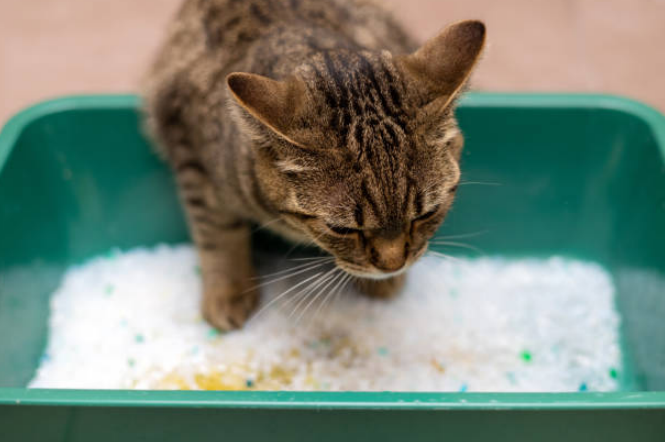
Scented cat litter has advantages, and being aware of the advantages can guide you in deciding whether it suits you.
● Effective Odor Control for Humans
Scented litter will also make your house smell fresher as it helps hide the odor of cat waste. This greatly assists small apartments or houses with multiple cats, as the smells can quickly intensify. The room can be made inviting with a nder or fresh linen-scented litter, making the pet owners comfortable with visitors.
However, this advantage should also be effective for the cat's comfort; they always come first.
● Wide Range of Options
➢ Clumping Clay is the most common and affordable, usually flower-scented or fresh scents.
➢ Silica Gel Crystals absorb moisture and odor; some are fragrant to add freshness.
➢ Natural Litters include Corn, wheat, or pine, occasionally lightly perfumed with cedar.
➢ Litters that are environmentally friendly and have soft scents.
If the risks of scented litter outweigh the benefits for your cat, plenty of alternatives keep you and your pet happy. Let’s explore some effective options.
A litter that contains no added odors is best if your cat has sensitive skin or airways. Such litters are corn, walnut, or recycled paper and does not absorb odors using harsh chemicals. They also have less tendency to irritate airways or skin, and thus, they are ideal for cats with health issues.
● Managing odors in a litter box without fragrances is possible by placing a thin layer of baking soda on the bottom. Then put litter in the box without any smell.
● Baking soda is a natural deodorizer that removes odors in the air.
● Place the baking soda in small boxes or loose on the surfaces.
Modern pet products can reduce the need for scented litter altogether. Automatic pet feeders and water fountains maintain a clean and stress-free environment for your cat. Maintaining a clean litter box is achievable with a fresh and regular feeding area without perfumes.
Check the 9 Best Dog-Proof Litter Boxes for Cats in 2025 for good and safer options.
You do not require scented litter to make your cat's litter box fresh. It is easy to manage aromas and make your cat comfortable and happy with some simple habits.
● Scoop the Litter Box Daily
Take the litter box out daily to prevent foul odors. A quick scoop takes just a minute and significantly reduces the need for fragranced litter.
Check How Much Litter to Put in a Litter Box for Happy & Healthy Cats for deeper information.
● Clean the Litter Box Regularly
Clean the box at least once or twice a week. Put a little bit of gentle scent-free soap and scrub so that no strong odors remain on the surface to disturb your cat. Powerful or fragrant cleaners may remain and frighten your cat. Use pet-safe cleaners instead. A clean box naturally keeps odors at bay.
● Improve Ventilation Around the Litter Box
Place the litter box in a ventilated room where the odor disappears naturally. An open window or a little fan can make a miracle to ensure fresh air.
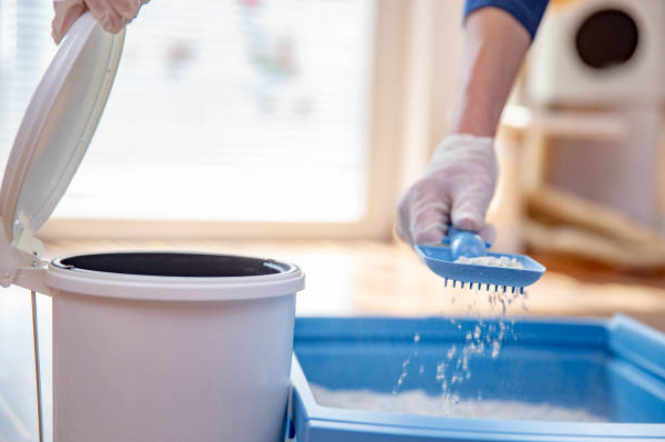
The cat litter selection is significant to your cat's safety and comfort. These are the easy steps to make your decision.
● Carefully Review Ingredient Labels
Never use toxic chemical-containing litter. Check the label of the ingredients. Litter made of plants, e.g., corn or walnut, may be healthier and safer.
As you change to a new litter, do not expose your cat to stress by introducing it fast. Place a new litter beside your existing litter. Take the same amount a week; combine the two.
● Consult Your Veterinarian for Guidance
Before purchasing cat litter, consult your veterinarian. They will advise you on solutions that suit your cat, making it comfortable and safe.
For more pet care advice, share your pet story with us..
Is scented litter bad for cats? The answer is yes in most situations. Fragrant litter can harm your cat's health and behavior, even though it works wonders at masking human odor. Having breathing irritations and skin sensitivities, avoiding the litter box, and being stressed, the feline is affected in several ways, which are huge drawbacks. Smart pet products, regular litter box cleaning, and unscented litter can easily satisfy you with no smell and less harm to the cat.
At WOpet, we’re here to support you with products and resources designed for your cat’s well-being.
Are you ready to make your cat feel like it is in a better environment? Look in our collections to find innovative solutions for your pet.
Does the scented litter pose any danger to cats with asthma or breathing difficulties?
Yes, these cats may have a problem with scented litter. Low-dust litter, such as corn or pine, is less dangerous to sensitive cats as it is unscented. Your vet should be consulted in case of breathing problems.
Does litter smell make cats have urinary issues?
Not directly, but when your cat does not use the litter box because of the smell, it may develop problems with urination. Pay attention to such signs as accidents outside the box or straining. Change litter to unscented and consult a vet when necessary.
What can be a good alternative to scented litter?
Synthetic fragrances do not control odors in natural litters like corn, wheat, or pine. They are more cat-friendly and eco-friendly. Sensitive kitties should use World's Best Cat Litter.
How frequently do I need to change scented litter?
Change clumping scented litter every 1-2 weeks or more, depending on the number of cats, and scoop daily. Crystal or non-clumping litter can last up to one month. Clean earlier when odors are present or litter appears dirty.
Does scented litter influence the behavior of my cat?
Yes, litter box avoidance can be caused by strong odors that result in accidents or stress. Be on the lookout for hesitation or scratching out of the box. See whether behavior changes with a less smelly or unscented litter.
Are there any safer scents for cats?
Such fragrances as pine or baking soda do not irritate as much as the synthetic ones. There should be no heavy floral or perfumey fragrances. New litter should always be tested, and reactions such as sneezing should be monitored.
What are the signs to look for in sensitive cats?
Look out for sneezing, coughing, scratching, or litter box avoidance. These signs show that the odor is disturbing. Change to unscented litter and see a vet if there is no improvement in symptoms.
Label:
Popular Post

What to Feed a Sick Dog With No Appetite? [2025 Guide]
May 16, 2023
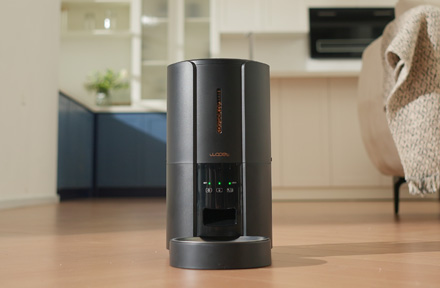
Troubleshooting Common Issues with Automatic Pet Feeders: Tips & Tricks for Pet Owners
Oct 26, 2023

Why Does My Cat Cough After Drinking Water? 8 Potential Reasons
Mar 13, 2023
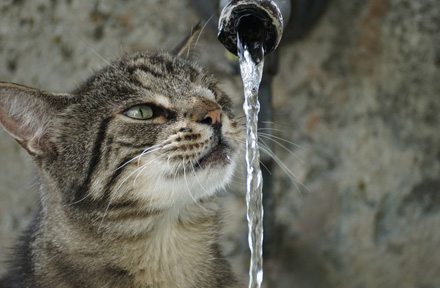
Why is My Cat Throwing up Water? Top 5 Causes Here
Feb 08, 2023
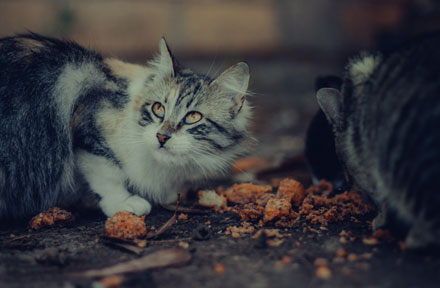
My Cat Only Eats A Little at A Time - What to Do?
Feb 27, 2023
$99.99
$129.99
Copyright © 2025 WOPET. All Rights Reserved.